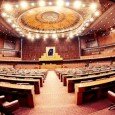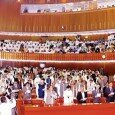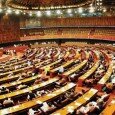By Ahmad Yar Hirraj –
The case for prioritising the popular vote
Democracy is a broad term used for participatory governments elected by the people. Various forms of democracies are functioning in different countries of the world. However, there is no single type of a successful democratic model which can be regarded as the best system of government. Nations have to modify and adapt their democratic systems in accordance with their suitability and particular needs.
An election is like a census of opinion which determines how a country should be governed. Only if an Assembly represents the full diversity of opinion within a country can its decisions be regarded as legitimate. A true democracy must ensure that all Political groups within the country get fair representation according to their share in the population.
Pakistan has a federal parliamentary system of government. The parliament consists of two houses, the Senate and the National Assembly. The Senators are elected by the members of the Provincial Assemblies, whereas the members on general seats in the National Assembly are elected by the people.
The National Assembly of Pakistan has 342 seats. There are 272, single member, territorial, electoral constituencies, demarcated on the basis of population. These are known as the general seats and the members on these seats are elected by direct votes cast by the registered voters within the constituencies on the basis of adult franchise.
The remaining 70 seats are reserved for women (60 seats) and non Muslims (10 seats). These seats are allocated on the basis of total number of general seats secured by each political party in the National Assembly. Members are nominated by their respective parties against the allocated reserved seats.Thus a political party in Pakistan must win at least 5 general seats in the National Assembly in order for it to get one reserved seat for women. Similarly, 27 general seats must be won to secure one reserved seat for non Muslims.
However, if these seats were allocated on the basis of popular votes secured by each political party in the general elections, a party not winning any general seats would still have the chance of getting representation in the National Assembly.Our electoral system only caters for a popular opinion group which has concentration within a territorial area or constituency. Thus an entire political party may not get even a single seat in the National Assembly even though it may have secured a large number of aggregate votes scattered across the country.
On the other hand, an individual getting much fewer votes may end up in the National Assembly because his votes are confined within one territorial constituency.Assume a multi-party election held in 272 constituencies where the average votes cast per constituency are one hundred thousand and the total votes polled are 27 million. Assume that one political party gets ten thousand votes in each constituency, thus getting an aggregate of about 3 million votes. However this party is unable to get even a single seat in the parliament as its 3 million voters are scattered across 272 constituencies and there is not enough concentration of voters in any one constituency to win a general seat. On the other hand, an individual running independently may win his seat by securing fifty thousand votes (or even less), when a political group of 3 million people is going unrepresented.
All voters deserve representation and all political groups in the society deserve to be represented in the legislature in proportion to their strength within the electorate. In other words, everyone should have the right to fair representation. It is important to devise a democratic system which ensures the inclusion of all political groups in the country. Every political party, no matter how small, must get representation in the parliament, in proportion to its size in the electorate.The combination of constituency based electoral system, plus reserved seats based upon popular votes secured by the political parties, would ensure a truly representative legislature which includes all opinion groups within the society.
Resultantly, the Parliament would become more legitimate, and would enjoy full confidence of the people.National Assembly is a directly elected body. It is only fair to ask that the reserved seats in this august house should also be elected in a more direct manner. Thus the reserved seats for women should be allocated on the basis of women’s votes secured by each political party. Similar arrangement should be made for allocation of seats reserved for minorities.The major concern for every Parliamentarian is to be re-elected. Even the party leaders are mostly concerned about the demands of their constituents instead of focusing on the national issues.
This is because of our current system of elections. If the reserved seats were allocated to the political parties on the basis of aggregate votes secured throughout the country, then party leaders would be able to make it to the National Assembly without having to worry about their constituencies. Thus the focus of the political leadership would remain on national politics, and not be narrowed down only to their constituencies.It is therefore suggested that the prevailing system of elections in Pakistan should be amended so that reserved seats in the National and the Provincial Assemblies are allocated on the basis of total number of aggregate votes secured by each political party in the general elections.It is also suggested that provision should be made to create reserved seats of general category, in addition to seats reserved for women and non-Muslims. Thus every political party would be most fairly represented in the National and the Provincial Assemblies.
The writer is former District Nazim Khanewal and special assistant to the Prime Minister































































































